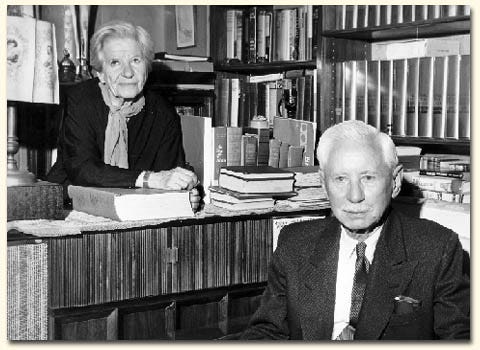Will Durant was a 20th-century American philosopher and historian with a taste for the sprawling. Together with his wife Ariel, Durant published The Story of Civilization in 11 large volumes between 1935 and 1975. One of the volumes won the 1968 Pulitzer Prize for general non-fiction.
But not all Durant’s writing was voluminous. In a short essay penned in late 1945, Durant delivered the best two-paragraph case for history I’ve ever read.
“We are choked with news,” Durant wrote, “and starved of history.”
Think about daily news in 1945. Telegrams, newspapers, and radio. Newsreels in the movie theatres. And today? The usual way to describe the information available to us about what is happening right now is to say that it “has grown exponentially.” That feels like understatement. We live in a world where it’s mundane for a soldier to share video of an ambush with the entire population of planet earth before the shooting has even stopped. News is a relentless torrent. It’s overwhelming.
This makes Durant’s message hopeful. To understand the present, we don’t need to constantly subject ourselves to that torrent and struggle to turn information into meaning. In fact, we need to spend less time with the torrent — and more with history.
It is a mistake to think that the past is dead. Nothing that has ever happened is quite without influence at this moment. The present is merely the past rolled up and concentrated in this second of time. You, too, are your past; often your face is your autobiography; you are what you are because of what you have been; because of your heredity stretching back into forgotten generations; because of every element of environment that has affected you, every man or woman that has met you, every book that you have read, every experience that you have had; all these are accumulated in your memory, your body, your character, your soul. So with a city, a country, a race; it is its past, and cannot be understood without it. It is the present, not the past, that dies; this present moment, to which we give so much attention, is forever flitting from our eyes and fingers into that pedestal and matrix of our lives which we call the past. It is only the past that lives.
Therefore I feel that we of this generation give too much time to news about the transient present, too little to the living past. We are choked with news, and starved of history. We know a thousand items about the day or yesterday, we learn the events and troubles and heartbreaks of a hundred peoples, the policies and pretensions of a dozen capitals, the victories and defeats of causes, armies, athletic teams. But how, without history, can we understand these events, discriminate their significance, sift out the large from the small, see the basic currents underlying surface movements and changes, and foresee the result sufficiently to guard against fatal error or the souring of unreasonable hopes?



Great quote. Of course Durant's volumes of history and civilization as well as his ground breaking book "The Story of Philosophy" should be known to everyone. In equal measure his racist beliefs and commitment to eugenics makes him hardly worthy of unqualified praise. In a word, much of his work is now considered toxic. To me, he was much more than those failings and he certainly distanced himself greatly from his youthful flirtation with Anarchism and Eugenics. His later praise of religion and dictatorship hardly balances it out though. Perhaps, its best to realize how great he was considering how flawed his thinking was in some areas. We should take as warning that like him we can get sucked into a dream of historical events, missing what lies beneath surface realities. I would suggest everyone read him and do what he did, which was to take a critical understanding of history. If we draw different and better conclusions and lessons from history, then we are worthy heirs to Durant's work.
Exactly right Dan.